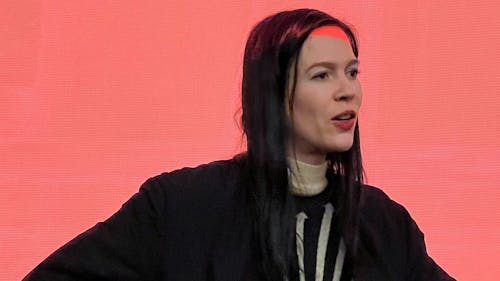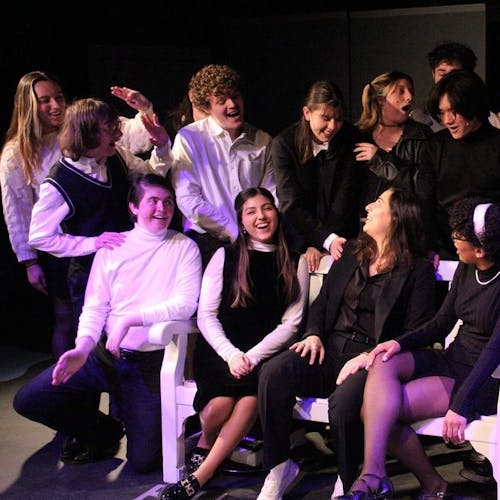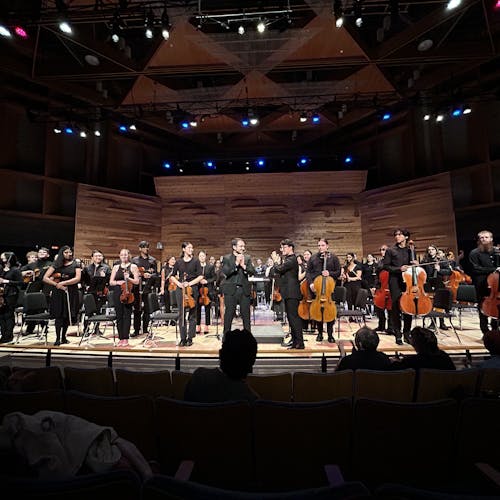Insider Beat: Q&A with NJ Film Festival's Week 3 filmmakers, actors

Week three of the New Jersey Film Festival featured another collection of exciting projects, including "Innocent Observer," "Blue Bird" and "Body Issues." The people behind the scenes and in front of the camera spoke to The Daily Targum about their creative process.
"Innocent Observer" interview with filmmaker Evelyn Reese
Q: What was the main inspiration for this film?
Reese: "I looked at the 'he loves me, he loves me not' kind of thing, and then, I tried to twist it for social issues and more like body image issues and social pressures."
Q: What genre would you classify this film as?
Reese: "I don't know, honestly. I guess it's kinda horror, but it's just kinda silly … It's not a comedy, but it's not like "horror, horror." It's not like 'The Shining.'"
Q: In the writing process, did this film come to you in one huge wave, or did it take time? Reese: "I actually don't write scripts."
Q: Was it improvised?
Reese: "Yeah, pretty much. I had like a couple ideas, but other than that, (lead actor Sofia Squicciarini) is very much tolerant of me and the things I wanted to do."
Q: Have you ever directed an improv film? Reese: "Kind of every film that I've made, I don't write a script for. I mean, I like it. I think it's fun. It's more freeing, I guess. Like, I don't have to stick to a script."
"Bluebird" interview with lead actress Aisling Fagan
Q: How did you get in tune with this character?
Fagan: "I reflected back on personal moments in my life that just kind of connected to grief and relationships with other people, and I just thought about that whenever I was acting with my character. I just mostly focused on the aspects of her life that maybe weren't explicitly told about in the film."
Q: How long have you been acting?
Fagan: "I started maybe six years ago — professionally, for about five."
Q: Was working during COVID-19 as a child actor, intimidating at all? Was it hard?
Fagan: "It was a bit intimidating because now we had all these self-records and all that, and I personally liked it better when it was with other people … I enjoy knowing what other people are thinking about. It was kind of daunting to do a self-record and then not know for months what's going on. It was definitely overwhelming for the time being, but I just kinda got used to it."
Q: Do you have any certain methods or techniques that you follow, or do you just listen to the director?
Fagan: "I listen to the director, but I also find my own story for the time being. I kind of read her story and interpret it in certain ways and then ask questions about certain things like, "hey, would this be right?" just to make sure I'm on the right path and all that."
Q: Do you mostly prioritize your acting career, or do you do school first and then acting?
Fagan: "It varies, to be honest. Sometimes, I prioritize acting more and school, second. But things have kind of slowed down because of the actor's strike and all that. So, I'm mostly focused on school right now."
"Body Issues" interview with filmmaker Marjorie Conrad and sound designer Gabriel Morana
Q: This was all shot on a GoPro, 60 frames per second. Usually, films are shot on a DSLR or a cinema camera, 24 frames per second. Why that by default?
Conrad: "I knew I wanted the camera to sort of roam around — a lot of quick pans. I kind of prefer more frames to work with — just a smoother movement to me. That's primarily it. It just feels a bit more hypnotic. I never wanted it to feel like it was stuttering or it felt like a series of stills."
Q: I adored the weird, distorted sound design – how did you get those distorted effects?
Morana: "We worked closely together over Discord. I'm from Frankfurt, Germany. We basically worked remotely. It worked amazingly … I set it up so (Conrad) could hear all the sound lossless … Probably the best collaboration I've had with someone. We really hammered all the little details down. Like, we went over and over and over."
Q: Working remotely, do you think that benefitted your creative process towards the sound? Because the film is very disconnected at points, for the character.
Morana: "Interesting perspective … Maybe, yeah, that helped to have a bit of distance from the director. I don't know."
Conrad: "It helps me. It helps me to bring you in after, because I'm biased, you know? All the images are attached to some context, some sort of unpleasant weather."
Q: This movie is very lonely. I love that about it because it's just her. It's her at a beach and then a hotel. Why limit yourself to this extent?
Conrad: "I don't know, empty spaces sort of speak to me … You stare at a space long enough, it becomes completely abstract. That's what I like about it. I also love motels and, you know, trashy American motels. Specifically that one I shot at the Marco Polo is the one Kurt Cobain would (go) for drug use. It's like a weird Seattle relic … I love decay in general. And, you know, the Pacific Northwest in general is a very lonely, alienating landscape."
Q: The first word I've always seen other film gurus use is that people consider this movie to be "challenging." Do you think it's challenging?
Morana: "It depends."
Conrad: "I mean, it depends. I've watched so much stuff, and at a certain point, I can't view something too normal. It's challenging for me when it's holding my hand. I really hate when music's too — anything on the nose, really just irks me."
The next iteration of the NJ Film Festival, the United States Super 8 Film & Digital Video Festival, will begin on Saturday and conclude on Sunday.



